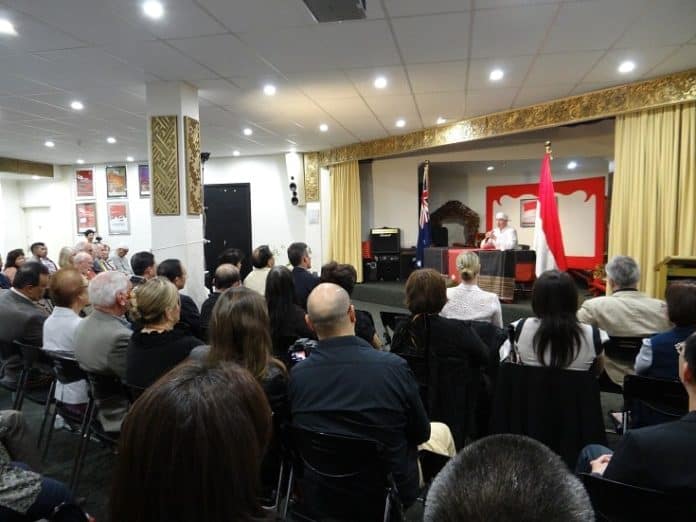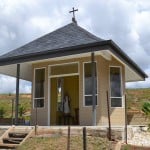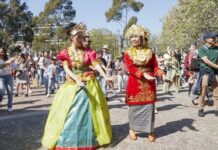
Menjaga iman di Australia itu ternyata penuh tantangan. Demikian terbaca dari penuturan para pemuka agama dalam laporan utama OZIP kali ini. Beribadah ke gereja, sekalipun hanya seminggu sekali, ternyata tak semudah dibayangkan. Minggu adalah hari keluarga, saat-saat terbaik untuk menemani pasangan hidup atau anak-anak setelah sepekan sibuk bekerja.
“Sebagian orang Indonesia yang menikah dengan orang Australia, pergi ke gereja itu kadang tidak mudah. Karena banyak orang Australia yang tidak lagi ke gereja atau bahkan tidak pernah ke gereja,” ujar Pendeta Kuncoro dari Indonesian Congregation Camberwell.
Begitu pula ketersediaan sarana ibadah yang sangat terbatas seperti yang dialami oleh para penganut Hindu. Misalnya dalam upacara Hari Raya Kuningan, untuk sementara mereka laksanakan di KJRI Melbourne. Sementara bagi jamaah Muslim, salat Hari Raya Idul Fitri dan Idul Adha dilaksanakan di hall besar yang mereka sewa, karena belum ada lokasi khusus yang dapat menampung luapan jamaah yang melebihi kapasitas masjid-masjid yang ada.
Di tengah semua tantangan itu, tak membuat mereka menyerah, justru memacu untuk berprestasi yang pada gilirannya membawa nama baik Indonesia. MAHINDRA Bali umpamanya, terpilih sebagai role-model di Victoria sebagai warga pendatang yang taat aturan/hukum. Sebagai penghargaan atas capaian itu, pada 2013 mereka menjadi penampil utama dalam acara resmi Parlemen Victoria. Sementara jemaat KKI saat ini merupakan terbesar keempat penganut Katolik di Victoria. Mereka mempunyai Rumah Doa di Our Lady of Ta Pinu Marian Centre, Bacchus Marsh. Rumah Doa ini diresmikan perberkatannya oleh Mgr. Greg Bennet, Vicar General Archdiocese of Melbourne.

Dari beberapa capaian itu, terlihat bahwa kegiatan keagamaan ternyata mampu menembus ruang-ruang diplomasi yang tak bisa ditembus oleh cara-cara konvensional. Ketika warga Australia menerima sepenuhnya pendatang Indonesia, itulah sejatinya buah diplomasi antarwarga yang selama ini diinginkan. Pendekatan agama terbukti punya kekuatan untuk itu.
“Sudah ada umat KKI yang dilibatkan dalam perayaan misa gereja lokal seperti aktif sebagai Misdinar/pelayan altar, Lektor/pembaca bacaan suci atau menjadi anggota koor,@ tutur Chaplain KKI Melbourne Pastor Boni Buahendri, SVD. “Selain itu ada juga yang terlibat dalam Paroki lokal, tempat dimana mereka berada, sebab salah satu tujuan chaplaincy KKI adalah ‘being rooted in the lokal church too’.”
Dalam ungkapan lain Ustadz Hamim Jufri menyatakan, “Pada akhirnya, sebagai masyarakat Indonesia yang tinggal di Australia ini, lembaga keagamaan seperti IMCV ini tetap berpikir dan bertindak demi kemajuan bangsa Indonesia.”
Rasanya, sebagai pendatang Indonesia, kita harus semakin banyak bersyukur kepada Tuhan. Keragaman kita dalam etnik dan keyakinan, justru bisa menjadi kekuatan besar dalam menunjang diplomasi bangsa. Persoalannya tinggal bagaimana kita mengatur strategi agar tujuan mulia itu tercapai. Menjaga iman di tanah seberang, ternyata dapat pula menjadi sarana diplomasi.
Towards Religious Diplomacy
It turns out keeping your faith in Australia is full of challenges. As can be read from the narratives of religious leaders in Australia in the main report for OZIP this month. Worshipping in church, even once a week, is not as easy as one imagines. Sunday is family day, and is the best time to accompany a spouse or children after a busy week at work.

“For Indonesians who marry Australians, going to church is sometimes not easy. This is due to the fact many Australians do not go to church anymore or have never even been to church,” stated Pastor Kuncoro of the Indonesian Congregation Camberwell.
Similarly, the availability of worship facilities is very limited as experienced by Hindus. For instance, in the Kuningan Day (Hari Raya Kuningan) ceremony they carry out their activities at the Indonesian Consulate in Melbourne. While for Muslims, the prayer for Idul Fitri Day (Hari Raya Idul Fitri) and Idul Adha is conducted in a large hall that the group rents, because there is currently no specific location that can accomadate a congregation of that size and currently exceeds the capacity of existing mosques.
In the midst of these challenges, it does not make them want to give up, it acts as a trigger to bring respect to the name of Indonesia. MAHINDRA Bali for example, was chosen as role-model for migrants who obey the rules/law. In recognition of these achievements, in 2013 they became the main performers in an official ceremony at Victorian Parliament. While the Indonesian Catholic Family (KKI) is currently the fourth largest Catholic group in Victoria. They have a House of Prayer at Our Lady of Ta Pinu Marian Centre, Bacchus Marsh. Mgr. Greg Bennett, Vicar General Archdiocese of Melbourne officially unveiled the House of Prayer.
From some of the achievements, it can be seen that the religious activities were able to penetrate areas of diplomacy that could not be penetrated by conventional methods. When Australians fully embrace Indonesian migrants, it is actually a sign of the diplomacy that until now has been desired. The religious approach has proven to have this as a strong point.
“There are KKI Catholics who are involved in the celebration of local Church Masses such as Acolytes/alter boys, Lectors/readers of the sacred readings or as members of the choir,” said Chaplain KKI Melbourne Pastor Boni Buahendri, SVD. “There are also people involved in KKI for a local parish, as one of the aims of the KKI Chaplaincy is expected to ‘being rooted in the local church too’.”
In other words Islamic teacher (Ustadz) Hamim Jufri says “Finally, for the Indonesian community who live in Australia, institutions such as IMCV still think and act for the betterment of the Indonesian nation.”
It feels, as an Indonesian migrant, we need to give even more praise to God. Our diversity in ethnicity and faith, can be a major force in supporting national diplomacy. The problem is how we set the strategy to achieve this goal. Keeping faith away from home, it turns out can also be a means of diplomacy.
















